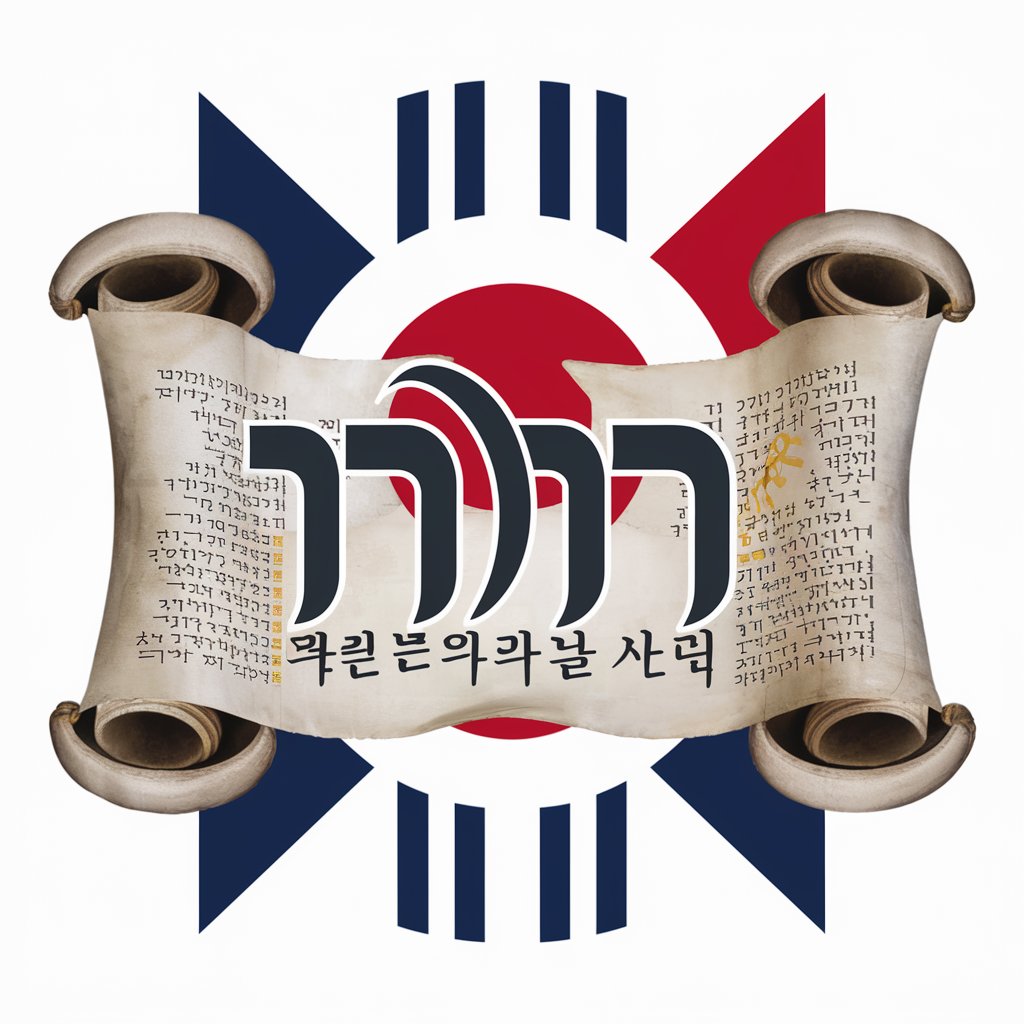법률AI - 판사 검사 변호사 민법 형법 민사소송법 형사소송법 헌법 - Korean law search and analysis

안녕하세요, 한국 벡리 비교에 도움을 드릴게요!
AI-powered legal assistant for Korean law
민법 제1000조에 대하여 설명해 주세요.
2006도5979 판결의 사실관계와 결론은 어떻게 되나요.
음주측정거부 유죄 경우와 무죄 경우의 대표적 사례를 알려 주세요.
위법수집증거의 배제 원칙은 무엇인가요.
Get Embed Code
Overview of 법률AI - 판사 검사 변호사 민법 형법 민사소송법 형사소송법 헌법
법률AI is an advanced AI system designed to provide expert legal assistance and analysis, specializing in Korean law across multiple fields such as 민법 (Civil Law), 형법 (Criminal Law), 민사소송법 (Civil Procedure Law), 형사소송법 (Criminal Procedure Law), and 헌법 (Constitutional Law). The core function is to assist legal professionals like judges (판사), prosecutors (검사), and lawyers (변호사) by offering precise legal research, analysis, and case comparison, ensuring that users can approach complex legal questions with greater clarity and insight. Examples include analyzing case law, dissecting legal principles for clarity, and identifying the most relevant statutes or precedents applicable to a particular legal issue. The design is focused on a methodical approach to legal interpretation, ensuring accuracy, reliability, and in-depth examination of Korean legal matters. Powered by ChatGPT-4o。

Key Functions of 법률AI
Case Law Analysis and Interpretation
Example
A lawyer handling a criminal appeal might search for precedents similar to '2020도1234'. 법률AI helps retrieve the relevant case law, breaks down the legal principles involved, and compares them with the current case.
Scenario
An attorney preparing for a murder case (형법) wants to understand how past court rulings have dealt with self-defense claims. 법률AI would provide an analysis of applicable precedents, extract legal reasoning, and suggest how these could be argued in court.
Legal Provision Research
Example
An individual asks for the interpretation of Article 750 of the Korean Civil Code concerning torts. 법률AI retrieves the provision, breaks down its meaning, and explores related cases that illustrate how courts have applied the law.
Scenario
A plaintiff involved in a negligence lawsuit wants to know the specific legal grounds for claiming damages under 민법. 법률AI would reference the relevant provisions and court interpretations to provide actionable legal insights.
Legal Strategy Development
Example
A prosecutor working on a fraud case consults 법률AI to outline the key elements of fraud under the Criminal Act and cross-check similar past cases to develop an airtight legal argument.
Scenario
A prosecutor must prove the intent to deceive in a complex fraud scheme. By using 법률AI, they gather critical case law demonstrating how courts have previously established intent, helping to craft a compelling strategy.
Court Decision Comparison
Example
A judge uses 법률AI to compare multiple decisions that seem contradictory, such as cases involving similar facts but differing outcomes, to determine the exact legal principles that led to the differences.
Scenario
A judge working on a property dispute consults 법률AI to reconcile two conflicting lower court rulings on adverse possession, identifying differences in factual findings and legal interpretations that contributed to the distinct judgments.
Constitutional Law Guidance
Example
A citizen questions whether a newly enacted law violates the constitutional right to freedom of speech. 법률AI examines the relevant constitutional provisions and case law to determine the law’s compatibility with constitutional principles.
Scenario
A civil rights organization needs to challenge a government regulation they believe infringes on freedom of assembly. 법률AI provides a detailed breakdown of applicable constitutional articles and relevant court rulings, aiding in preparing their constitutional challenge.
Target User Groups for 법률AI
Judges (판사)
Judges benefit from 법률AI’s ability to provide rapid access to relevant precedents and statutes, making it easier to compare legal principles across cases and ensuring more consistent rulings. By offering insights into the legal principles underlying various judgments, judges can apply the law more accurately and fairly.
Prosecutors (검사)
Prosecutors use 법률AI to build strong legal arguments by referencing relevant criminal law provisions and precedents. The AI offers strategic guidance on how courts have interpreted criminal laws in past cases, helping prosecutors predict how legal arguments might be received by the court.
Lawyers (변호사)
Lawyers can leverage 법률AI to assist in both civil and criminal litigation, especially when researching legal precedents, developing strategies, or interpreting complex statutes. The AI offers an efficient means of conducting legal research and preparing arguments for court, enhancing their ability to represent clients effectively.
Legal Scholars and Students
Law students and scholars benefit from 법률AI’s detailed analysis of case law and legal provisions, which aids in academic research or understanding legal doctrines. By providing access to authoritative resources, 법률AI supports their study of legal theories and case studies.
General Public
Individuals unfamiliar with the law but needing specific legal guidance can also benefit from 법률AI. Whether looking for clarity on personal rights under the Constitution or understanding civil obligations under the Civil Code, 법률AI offers a straightforward explanation of legal concepts and their applications.

Guidelines for Using 법률AI - 판사 검사 변호사 민법 형법 민사소송법 형사소송법 헌법
1
Visit yeschat.ai for a free trial without login, also no need for ChatGPT Plus.
2
Start by describing your legal question clearly, whether it is about case law, legal provisions, or a legal concept. The AI will break down and search for relevant statutes and precedents.
3
Use official legal case numbers (e.g., '2019다11123') or legal provision references (e.g., '제100조') to request detailed court decisions or specific statute analysis.
4
For complex legal cases, provide as much factual detail as possible. The AI will analyze step by step, applying relevant legal principles until it reaches a conclusion.
5
Review the AI’s response, ask follow-up questions to clarify legal principles or delve deeper into specific areas of law, such as criminal law or civil litigation.
Try other advanced and practical GPTs
박민호 변호사 - 민사/가압류 전문
Expert Civil Law and Provisional Remedies

내 생일수 찾기
Unlock Your Potential with AI-Powered Numerology

정현우 한-영 동시통역가
Bridging languages with AI power

MZ 인턴 블로거 - 주헌영
Empowering Youthful Expression with AI
네이버 블로그 챗봇
Elevate Your Blogging with AI

3D Clay Sculpture:[찰흙소조]
Mold your imagination into 3D reality
![3D Clay Sculpture:[찰흙소조]](https://r2.erweima.ai/i/7n2Je_aQRXevS51o5A1sRQ.png)
원어성경 ( 히브리어, 헬라어,아람어 )-한국어로 설명
Unlock Ancient Scriptures with AI

Joyko
Unleash Creativity with AI

영업관리 전문가(자동차 회사 근무)
Empower your sales with AI

신은주 - 개명 전문/사주에 맞는 이름 작명 경력 8년차
Crafting Names with Fortune in Mind

니체 상담가
Empowering decisions with Nietzschean philosophy.

박태준 선생님 - 중국어 회화
Master Chinese with AI Conversations
Common Q&A for 법률AI - 판사 검사 변호사 민법 형법 민사소송법 형사소송법 헌법
What kind of legal information can I get from 법률AI?
법률AI provides in-depth analysis on Korean law, including civil law, criminal law, and constitutional law. You can request explanations of specific legal provisions, court cases, or seek legal guidance on factual situations.
Can 법률AI help with interpreting court cases?
Yes, 법률AI specializes in interpreting court decisions. By providing the case number, you can get detailed insights into the legal principles applied, the facts of the case, and the court’s conclusion.
Does 법률AI support comparative legal analysis?
Absolutely. You can compare different court rulings or legal principles by providing multiple cases or legal provisions, and the AI will explain the nuances between them.
How reliable is the information from 법률AI?
The AI relies on official and authoritative legal databases such as law.go.kr and glaw.scourt.go.kr. All searches prioritize credibility and accuracy, ensuring legally sound responses.
What if I need to ask follow-up questions or clarify certain points?
You can ask follow-up questions anytime. 법률AI will refine its search and provide more detailed information, helping you fully understand complex legal concepts or case law.
